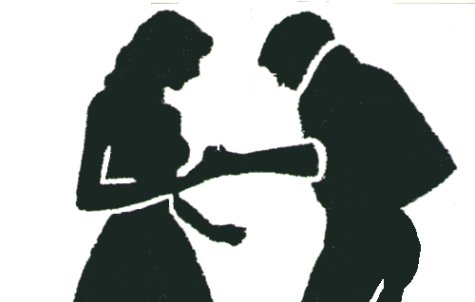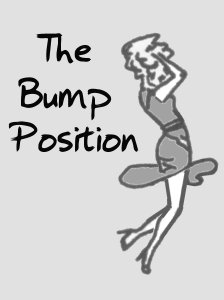The Story of the Texas Whip!
(plus its long-lost
companion dance,
the West Coast Swing!!)
Written by Rick Archer, SSQQ, 1998
|
 |
The Whip is a sexy Swing partner dance that originated right here in the heart of Texas.
Also known as Push in the Dallas
area, the Whip is quite similar to the national dance known as the West Coast Swing.
This is no surprise since in a way the Whip and the West Coast Swing are long-lost
brothers. They were both born in California, but were separated at birth.
|
|

|
The Whip
traces its roots to a bunch of Texas-born GI's who returned home
from California after the long fight of
World War II.
The Whip was spawned in the dives,
bars, honky-tonks, and western joints that surrounded the Texas oil fields and refineries
back in the late 40's and early 50's.
Back in those days you had dark, smoky
lounges with plenty of cheap beer. and a rough crowd looking to let off steam after a hard
day’s work. The jukebox played a steady stream of Texas Blues with a raw, angry sound
and rhythms best described as Stripper music.
Legend has it the Whip started as a
"pickup" dance that fit the suggestive "get down & dirty" lyrics
like tight pants clinging to a well curved woman. The man would lean against the bar
drinking a beer or smoking a cigarette with one hand while a woman would grab his other
hand for balance. Inspired by the music, she would start to roll her hips, then glide
forward and back to the beat. As she strutted her stuff, the man would act cool and
pretend to ignore the performance, but no doubt the corner of his eye tracked her
movements like a hawk measuring its prey!
|
The Texas Whip is basically an offshoot of the legendary
West Coast Swing.
Whip, spelled as it is with the word
"hip" in it, has always emphasized hip motion as part of its Basic. West Coast
Swing traditionally has favored more emphasis on flashy footwork. For 50 years, the
two dances stayed separate. Modern technology has changed all that. The Internet, the
availability of dance videotapes, national dance magazines, and the ease of travel
(allowing teachers and students to overcome the handicap of distance) have brought about
the change.
Here in the 90's the barriers that separated
the two dances for 50 years are fading faster than you can say "Berlin
Wall". West Coast Swing dancers see the awesome hip roll of the Whip and decide
on the spot they gotta have some of that. The Whip dancers see those flying,
prancing, dancing feet of the WC Swingers and want a piece of that action too.
Today you don't have to choose. The modern
trend is to merge the two dances together and constantly interweave from one style to the
other. The long-lost dances have been reunited. You can have them both !
|
So how did the two dances
get split in the first place ?
The earliest origins of Whip have been traced
to California during World War II. The 40’s marked the height of the Big Band era.
Swing Dancing was enormously popular in USO dance halls across the country at this time.
During World War II the population of the
state of California nearly doubled with its massive military industry, many military
bases, and important Pacific Theator seaports like San Diego, Los Angeles, and San
Francisco. Dancing was the best way for boys to meet girls in an age where time was
precious. In California the floors were so crowded that a new style of dancing
developed out of necessity.
 |
To
save space couples would pack into tight pockets
and dance in the same direction across the room.
As the precursor to what we now call West
Coast Swing, a serviceman would hold his ground while his partner would push off
from him, shuffle her feet, then snap back to him like a rubber band. This was the
start of the WC Swing Basic with its famous Coaster Step. When room permitted,
the man and lady would trade places, which gave rise to the Passing Step, the most common
step in West Coast Swing. The limitations of space created this "Slotted
Dance" where the man and woman always danced in a straight line (as opposed to Lindy,
Swing, and Jitterbug which allowed dancers to face any direction they wish, but took up
much more space). |
After the war ended,
Texans returning from the Pacific brought their California
dance home with them and tried it to the slower Blues music.
Almost immediately they noticed the music was
only half the speed of the faster Swing music. This changed the feel of the dance
completely. Since no one really knew what the footwork was, Texas girls would just grab
the guy’s hand and move to the music. As the girls played around with the back and
forth movement of the California dance, they discovered a provocative hip motion that fit
the slow, sensual music maybe too well. This adaptation created yet a new dance with a
style all its own. Some called it Push, some called it Whip, some called it downright
nasty.
Let's interrupt our
story for a brief explanation of the Hip Motion.
An
explanation of the Whip Hip Motion.
|
The Whip Basic has 6
beats of music :
Chart
1
1 and
2 3 and 4
5 and
6
Hitch and Step, Tra vel Step, Hitch and Bump
|
Chart 2
3 and
4 5
and 6 1 and
2
Tra vel Step, Hitch & Bump, Hitch &
Step
|
Hip Motion is not easy to
explain to someone who hasn't seen it.
Cheer up. Many students who have seen it don't understand it either.
There are two basic Whip
positions : the Hitch and the Bump.
The Hitch has the lady's hips
away from the man with an arched back.
The Bump has the lady's hips towards the man with her shoulders back.
A major part of the Whip Basic
involves arm tension, usually in a two-hand position. The lead is said
to be "double resistance".
Warning : We are about to write
about Whip timing. Few humans can understand what is being said here and those few
probably are
usually too analyticial to be able to dance. Be very careful :
If you can already do the Whip, ignore this next part. Attempting to understand it may
cost you the ability to dance for several days !!!.
|

|
Using Chart 2 above for
reference, each Whip Basic has three Hip Motions. The cadence is :
Travel Step, Hitch and Bump, Hitch and Step (5 and 6, 1 and 2).
First, the lady slides away from the man. We call this separation from the man the
"Travel Step". It is sometimes also a "Tap-Step" in certain
situations.
As the lady travels away from the man, he
"Pulls" against her arms... this stops her shoulders
from moving, but he can't stop her hips (nor would any sane man want to !). Her hips
keep going back past her shoulders till they hit the Hitch Position. Notice in the
picture above the lady's hips are back while her shoulders are forward.
Now the tension in the lady's arms and legs
needs to be released. As she snaps back towards the man, he suddenly "Pushes"
against her arms. If she resists the man through her arms, her shoulders are frozen still,
but her hips keep going forward till they hit the Bump Position.
The first resistance created the Hitch. The
second resistance created the Bump. Now the woman has tension in her arms and legs again.
She releases the tension into another Hitch Position. We call this second Hitch Position
the "Bounce Hitch". At this point she is out of momentum and ready to come
forward to start the whole process again.
The man is happy to oblige by pulling her
forward to start the Travel Step again. His major role is to provide counter balance for
the lady through arm tension. As a rule, men are thrilled to stand there and provide
a curvaceous lady all the opportunities to roll her hips in front of him as she desires.
|
 |
Unfortunately that is easier said than done.
Until the man learns what he is supposed to be doing, it is far too easy to knock the lady
off balance. Most men find it extremely tricky to coordinate the precise timing of their
leads with their equally complicated footwork.
In baseball it is called "good field, no
hit". Or vice versa. In Whip it takes a while to connect the arms, the hips,
and the feet so they all play for the same team (the one you are on !). Similarly
the ladies take a while to master the legendary hip motion. Even then her arms may
sabotage her work. This is why a good teacher can make a big difference. It is safer to go
slowly and learn it right than to be forced to undo quite a bit of mis-programmed muscle
memory.
However, once you get your act down, you will
knock 'em dead at the office Christmas Party. Civilians cannot get enough of the Whip when
they are seeing it for the first time. Promotions are not guaranteed, but the boss
is likely to recognize you in the hall from then on. Don't forget to smile.
Whip takes about 4 months to get the fundamentals, then a year for polish, and
perhaps
a lifetime to master. Fortunately the Journey is fascinating every Triple Step of the way
!
|
Please
Click Here for Page
Two of the History of Whip !
|
|